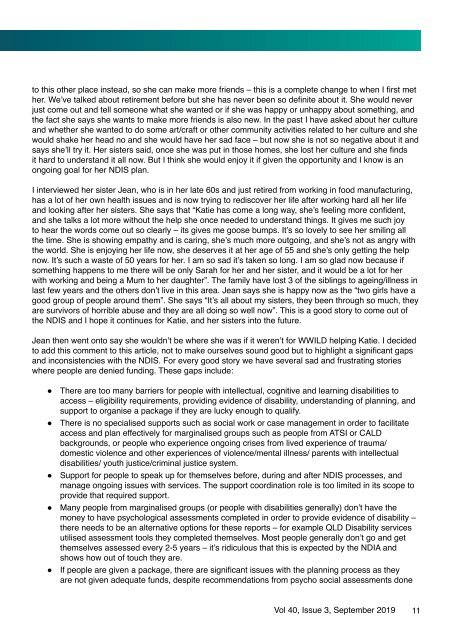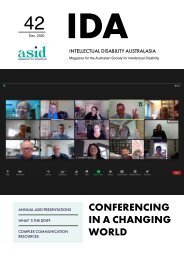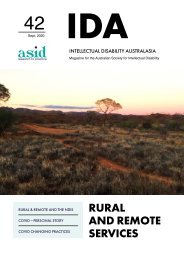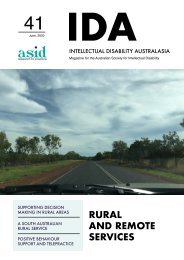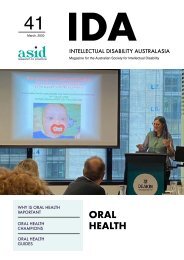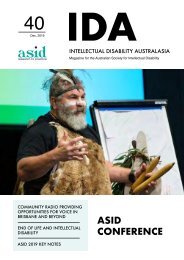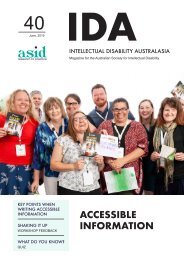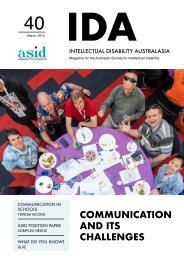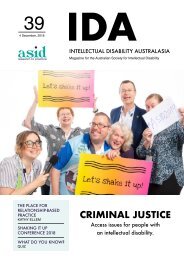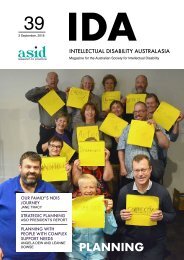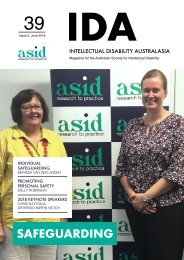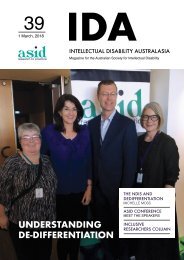IDA Magazine Vol 40 Iss 3 (Sep 2019)
- No tags were found...
You also want an ePaper? Increase the reach of your titles
YUMPU automatically turns print PDFs into web optimized ePapers that Google loves.
to this other place instead, so she can make more friends – this is a complete change to when I first met<br />
her. We’ve talked about retirement before but she has never been so definite about it. She would never<br />
just come out and tell someone what she wanted or if she was happy or unhappy about something, and<br />
the fact she says she wants to make more friends is also new. In the past I have asked about her culture<br />
and whether she wanted to do some art/craft or other community activities related to her culture and she<br />
would shake her head no and she would have her sad face – but now she is not so negative about it and<br />
says she’ll try it. Her sisters said, once she was put in those homes, she lost her culture and she finds<br />
it hard to understand it all now. But I think she would enjoy it if given the opportunity and I know is an<br />
ongoing goal for her NDIS plan.<br />
I interviewed her sister Jean, who is in her late 60s and just retired from working in food manufacturing,<br />
has a lot of her own health issues and is now trying to rediscover her life after working hard all her life<br />
and looking after her sisters. She says that “Katie has come a long way, she’s feeling more confident,<br />
and she talks a lot more without the help she once needed to understand things. It gives me such joy<br />
to hear the words come out so clearly – its gives me goose bumps. It’s so lovely to see her smiling all<br />
the time. She is showing empathy and is caring, she’s much more outgoing, and she’s not as angry with<br />
the world. She is enjoying her life now, she deserves it at her age of 55 and she’s only getting the help<br />
now. It’s such a waste of 50 years for her. I am so sad it’s taken so long. I am so glad now because if<br />
something happens to me there will be only Sarah for her and her sister, and it would be a lot for her<br />
with working and being a Mum to her daughter”. The family have lost 3 of the siblings to ageing/illness in<br />
last few years and the others don’t live in this area. Jean says she is happy now as the “two girls have a<br />
good group of people around them”. She says “It’s all about my sisters, they been through so much, they<br />
are survivors of horrible abuse and they are all doing so well now”. This is a good story to come out of<br />
the NDIS and I hope it continues for Katie, and her sisters into the future.<br />
Jean then went onto say she wouldn’t be where she was if it weren’t for WWILD helping Katie. I decided<br />
to add this comment to this article, not to make ourselves sound good but to highlight a significant gaps<br />
and inconsistencies with the NDIS. For every good story we have several sad and frustrating stories<br />
where people are denied funding. These gaps include:<br />
● ● There are too many barriers for people with intellectual, cognitive and learning disabilities to<br />
access – eligibility requirements, providing evidence of disability, understanding of planning, and<br />
support to organise a package if they are lucky enough to qualify.<br />
● ● There is no specialised supports such as social work or case management in order to facilitate<br />
access and plan effectively for marginalised groups such as people from ATSI or CALD<br />
backgrounds, or people who experience ongoing crises from lived experience of trauma/<br />
domestic violence and other experiences of violence/mental illness/ parents with intellectual<br />
disabilities/ youth justice/criminal justice system.<br />
● ● Support for people to speak up for themselves before, during and after NDIS processes, and<br />
manage ongoing issues with services. The support coordination role is too limited in its scope to<br />
provide that required support.<br />
● ● Many people from marginalised groups (or people with disabilities generally) don’t have the<br />
money to have psychological assessments completed in order to provide evidence of disability –<br />
there needs to be an alternative options for these reports – for example QLD Disability services<br />
utilised assessment tools they completed themselves. Most people generally don’t go and get<br />
themselves assessed every 2-5 years – it’s ridiculous that this is expected by the NDIA and<br />
shows how out of touch they are.<br />
● ● If people are given a package, there are significant issues with the planning process as they<br />
are not given adequate funds, despite recommendations from psycho social assessments done<br />
<strong>Vol</strong> <strong>40</strong>, <strong>Iss</strong>ue 3, <strong>Sep</strong>tember <strong>2019</strong><br />
11


